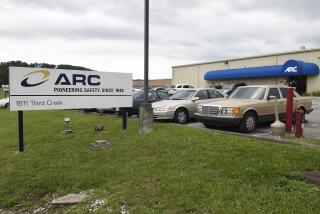Inhalers May Be Linked to Deaths
WASHINGTON — Asthma inhalers made by Schering-Plough Corp., recalled over concerns that they may not have contained an active drug, may be linked to the death of some users of the product, a consumer watchdog group said Thursday.
Albuterol inhalers were reported to be a “primary suspect” in 17 deaths that occurred from the fourth quarter of 1998 through the second quarter of 2000, the Public Citizen’s Health Research Group said, citing information provided by the Food and Drug Administration.
No deaths were reported to the FDA during the last two quarters of 2000 or the first three quarters of 1998.
According to the group, information provided by the FDA showed the number of reported deaths increased about the time of two recalls of albuterol inhalers in September 1999 and March 2000.
“This pattern of deaths, with none occurring before or after the interval during which the defective albuterol inhalers were shipped for use . . . strongly implicates these products as the causes of the deaths,” the group wrote.
Of the 17 patients who died, 10 were using or attempting to use inhalers from lots that were later recalled, Public Citizen said. Lot numbers were not listed for the other seven patients.
Five of the reports said patients were not getting relief from their asthma from the Schering-Plough inhalers.
Schering-Plough spokesman William O’Donnell said the Kenilworth, N.J.-based company has no evidence that a patient was harmed by an inhaler subject to the recalls.
“While there are some lawsuits claiming otherwise,” he said, “we are contesting them vigorously.”
He added: “To date, every inhaler returned to us by a patient claiming injury and alleging that the canister lacked active ingredient has been tested and found to contain active ingredient.”
Public Citizen renewed its call for a federal criminal investigation to determine whether Schering-Plough knowingly shipped millions of inhalers after it became aware of serious manufacturing problems.
Laura Bradbard, a spokeswoman for the FDA, said the agency is “looking very carefully at the situation with Schering-Plough, and we will consider this new data brought to our attention.” She did not comment further.
The inhalers were sold under the brand names Proventil and Warrick. Schering-Plough said on March 29, 2000, that it was recalling those brands of prescription albuterol inhalers made before Sept. 30, 1999, “as a precaution to address the remote possibility that an aerosol inhaler may not contain active drug.”
Separately, a coalition of consumer groups said it filed a lawsuit against Schering-Plough, alleging deceptive advertising and overpricing of Claritin.
The suit, filed in Superior Court in New Jersey by the Prescription Access Litigation project, alleges advertisements for Claritin falsely claim the drug works for everyone, thereby boosting demand and prices.
But Prudential Securities analyst Timothy Anderson said he expected the plaintiffs would have a tough time succeeding in their case.
“I don’t think the claims about deceptive marketing are any big deal, and it’s certainly something that would be tough to prove,” he said, adding that getting Claritin successor Clarinex approved is the biggest issue for Schering-Plough.
More to Read
Inside the business of entertainment
The Wide Shot brings you news, analysis and insights on everything from streaming wars to production — and what it all means for the future.
You may occasionally receive promotional content from the Los Angeles Times.










